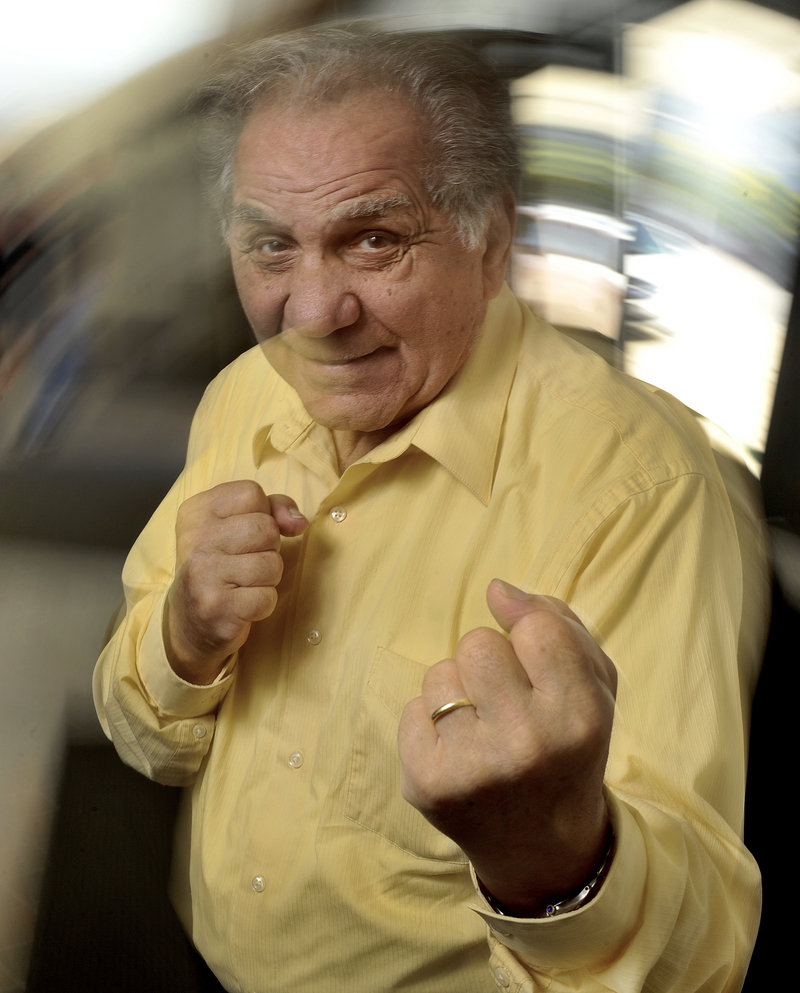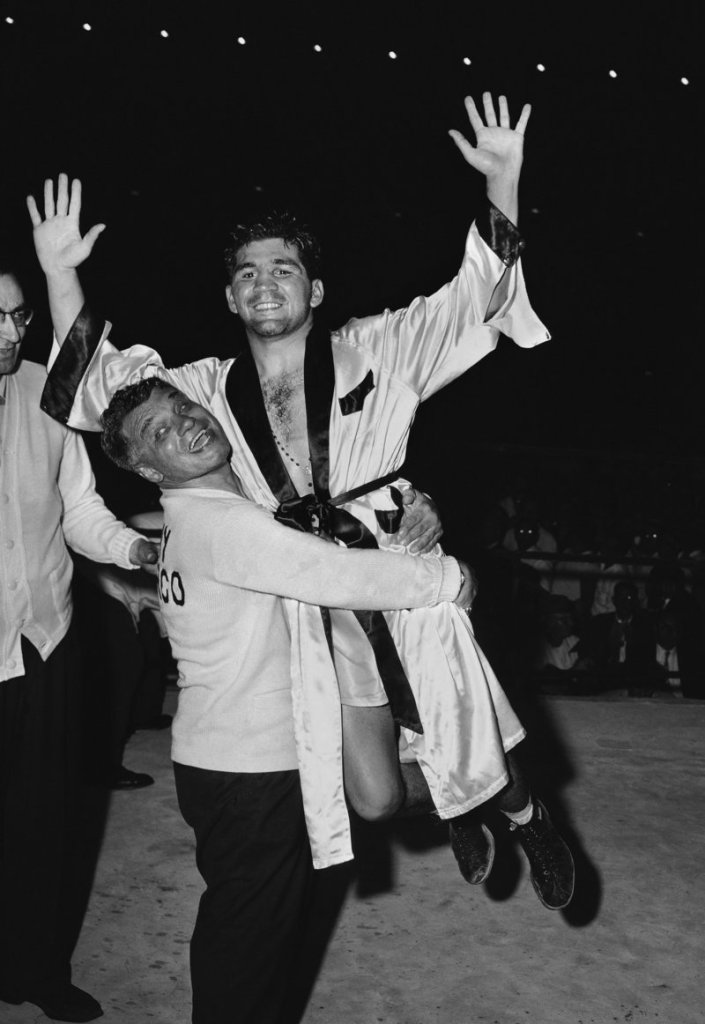PORTLAND – The black and white film of two fighters is blurred slightly, but there’s no mistaking the spent fury in the 11th round of a welterweight title match. The commentary is clear.
“Look at DeMarco. His legs (are) dead. His arms feel heavy. There’s noises in his head but he goes right in. You gotta love a guy with this heart.”
That’s one reason it was special to shake Tony DeMarco’s 81-year-old hand with its grip of an 18-year-old on Wednesday. He was in Portland to help promote the return of boxing to the Portland Expo next month.
DeMarco was the undisputed welterweight champion of the world in 1955 and had fought twice at the Expo in 1951. His eyes were full of life and pride, but his voice carried a gentle humor that was disarming.
You don’t have to be a fan of boxing to appreciate this man. But know he’s part of a vanishing piece of American culture. The men who were giants of the golden decades of boxing from the 1930s through the ’50s are all but gone.
The voice providing the commentary to the 1955 world title fight between champion DeMarco of Boston’s North End and Carmen Basilio of upstate New York was Rocky Marciano, then the reigning and undefeated heavyweight champ.
Basilio won that fight on a 12th-round technical knockout and took the championship away from DeMarco who had held it for a little more than two months.
“Look at him get up,” says Marciano after DeMarco was knocked down the second time in the 10th round. “There’s only one thing making him do it. That big heart. It certainly doesn’t come from his head. He doesn’t know where he is.”
You can find the film clip along with other fights on DeMarco’s website: tkotony.com. Listen to the compassion in Marciano’s voice. DeMarco was about 50 pounds lighter and half-a-foot shorter than the heavyweight champ, but they were brothers in arms, so to speak. Marciano grew up in Brockton, Mass.
DeMarco fought on a Marciano card at Braves Field in Boston. Their fathers were both shoemakers from Italy and met when their sons trained in New York’s Catskill Mountains.
Their mothers met in a beauty parlor in the North End. In a story posted on TheSweetScience.com, DeMarco tells of his mother, Giacomina, sitting next to another woman and saying, in Italian, “Il mio figlio a campione del mondo.” which is: My son is champion of the world.
The other woman says the same thing. Her name was Pasqualina Marchegiano.
Marciano fought many of his fights in Providence, R.I. DeMarco filled the old Boston Garden, walking from his home on Fleet Street, a few blocks from the Paul Revere House.
“Think about that,” said Al Valenti, a Boston-based promoter. “Here’s a kid who walked to the (old Boston Garden), won the championship and walked home. He didn’t arrive or leave like fighters do today with their posses.
In the 1950s, fighters like DeMarco were your neighbors.
DeMarco fought 31 of his 71 fights at the Boston Garden. He was the main event 21 times. Most were sellouts. Last fall, a statue of DeMarco was put in place near the intersection of Hanover and Cross streets at the entrance to the North End.
Valenti, whose grandfather Rip Valenti promoted some of DeMarco’s fights, was asked to introduce DeMarco at the unveiling. “I was humbled,” said Valenti. “I know what this man means to Boston. You say Ted Williams and Bobby Orr and Larry Bird and you should include Tony DeMarco.
“Tony was not a seasonal athlete. He fought year-round. He was a champ. He was a winner when boxing ruled.”
DeMarco retired in February 1962 winning a 10-round unanimous decision at Boston Garden. His final record was 58 wins (33 by knockout), 12 defeats and one draw. He was a puncher, wading into his opponent. Jake LaMotta, the raging bull of the 1940s, was DeMarco’s hero.
Wednesday, I shook DeMarco’s hand. We talked about the statue, only the second dedicated to a man in the North End. Paul Revere got their first.
I told DeMarco he earned his statue. The comment hit home. DeMarco isn’t a boastful man. He reached for my hand again. “Boxing has been good to me,” he said. “I’ve had a good life.”
Which is why he returned to Portland to help promote a fight card and why he’ll return again on Nov. 16 when it happens. He thinks he owes the sport.
Boxing owes him.
Steve Solloway can be contacted at 791-6412 or at:
ssolloway@pressherald.com
Twitter: SteveSolloway
Send questions/comments to the editors.




Success. Please wait for the page to reload. If the page does not reload within 5 seconds, please refresh the page.
Enter your email and password to access comments.
Hi, to comment on stories you must . This profile is in addition to your subscription and website login.
Already have a commenting profile? .
Invalid username/password.
Please check your email to confirm and complete your registration.
Only subscribers are eligible to post comments. Please subscribe or login first for digital access. Here’s why.
Use the form below to reset your password. When you've submitted your account email, we will send an email with a reset code.